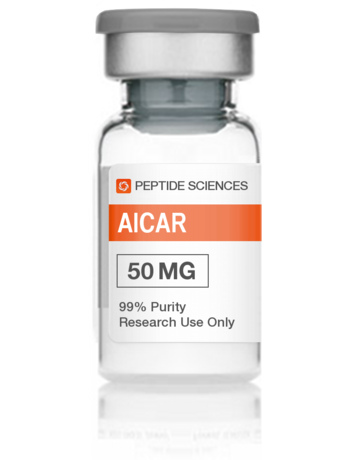AICAR peptide 50 mg ( 5-aminoimidazole-4-carboxamide ribonucleotide)
AICA-ribonucleotide (AICAR) [edit] AICAR (5-amino-1-β-D-ribofuranosylimidazole-4-carboxamide), also known as ZMP, is an AMP analog capable of stimulating AMP-dependent protein kinase activity (AMPK). caused by insufficient blood flow and oxygen to the myocardium. AICAR was first used in the 1980s as a method of maintaining blood flow in the heart during surgery.
AICAR is currently also shown as a potential treatment for diabetes by increasing the metabolic activity of tissues by changing the physical composition of muscles. AICAR (commonly called Acadesine) is an adenosine analog that penetrates cardiac cells to inhibit adenosine kinase and adenosine deaminase. myocardium. In cardiac myocytes, AICA-riboside is phosphorylated to AICA-ribotide (ZMP) to activate AMPK without changing the nucleotide level. ZMP is able to enter the de novo synthesis pathway for adenosine synthesis to inhibit adenosine deaminase, causing an increase in ATP and adenosine levels.Effects of peptide Aykar 50 mg
It has been shown that a short period of coronary artery occlusion followed by reperfusion before prolonged ischemia is known as preconditioning. It has been shown to be protective. Preconditioning precedes myocardial infarction, can delay cell death and provide greater myocardial salvage through reperfusion therapy.
AICAR has been shown to condition the heart shortly before or during ischemia.
- AICAR triggers a preconditioned anti-inflammatory state by increasing the production of NO by endothelial nitric oxide synthase.
- When AICAR is given 24 hours before reperfusion, it prevents postischemic adhesive interactions of leukocytes with endothelial cells with increased production of NO.
- AICAR-dependent preconditioning is also mediated by an ATP-sensitive potassium channel and a hemooxygenase-dependent mechanism. This increases the AMPK-dependent recruitment of ATP-sensitive K-channels to the sarcolemma, causing a reduction in duration of action and preventing calcium overload during reperfusion.
- Decreasing calcium overload prevents activation of ROS inflammation.
AICAR also increases AMPK-dependent glucose uptake through GLUT-4 translocation, which is beneficial for the heart during postischemic reperfusion.
Glucose increase during AICAR preconditioning extends the preconditioning period to 2 hours in rabbits and up to 40 minutes in humans undergoing coronary ligation.
As a result, AICAR reduces the frequency and size of myocardial infarction in humans by up to 25%, which improves blood flow to the heart. In addition, it has been shown that the treatment reduces the risk of early death and improves recovery after surgery after ischemic injury.




There are currently no reviews for this product.
Your review will be the first.
Tell other users of the site about the advantages and features of the product, share your impressions and expert opinion.